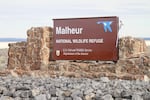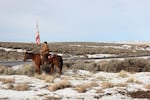
A sign welcomes visitors to the Maheur National Wildlife Refuge in Harney County. In early 2016, a group of men and women, mostly from out of state, took over this remote bird sanctuary for 41 days.
Rob Manning / OPB
Federal prosecutors must decide by Monday, Dec. 12 whether to move forward with a second trial in February for those who occupied the Malheur National Wildlife Refuge near Burns earlier this year.
The trial of the seven remaining defendants is scheduled to begin in February. They've been charged with a felony: conspiracy to prevent federal employees from doing their jobs at the refuge.
Related: All 7 Defendants Found Not Guilty In Refuge Occupation Trial
It’s the same charge occupation leaders Ammon Bundy, his brother Ryan Bundy and five others beat in October
when a jury acquitted them for their roles in the armed protest
that played out along eastern Oregon’s high desert.
The shocking verdict was a win for the patriot movement and others who believe the federal government doesn't have the authority to own land.
Now the government must decide how — or whether — to proceed with a second trial.
Prosecutors have a few options: they can move forward with the conspiracy charge, bring new charges — likely misdemeanors — or drop the charges entirely, meaning there wouldn’t be a second Oregon trial at all.
Wes Williams, a criminal defense attorney in La Grande, said it’s likely the government will move forward with a trial for this second set of defendants.
“It would be wise however for the prosecutors to allege claims they know they can prove instead of biting off more than they can chew,” Williams said. “A good trial lawyer never shoots the moon. A good trial lawyer pleads what he or she knows they can prove.”

Duane Ehmer patrols the Malheur National Wildlife Refuge complex with his horse Hell Boy during the occupation of the refuge in early 2016.
Amanda Peacher / OPB
The defendants in the February trial include Duane Ehmer, of Irrigon, Oregon. Ehmer gained notoriety during the occupation because he rode his horse, Hellboy, around the refuge, while waving an American flag. The images were published by news organizations around the world.
Another defendant, Jason Patrick of Bonaire, Georgia, is currently acting as his own attorney. Video played during the trial this fall showed Patrick at the cutting of a refuge fence back in January with the Bundy brothers and other occupiers.
Sean and Sandy Anderson of Riggins, Idaho, are also slated to go to trial next year. The married couple were among the final four hold outs at the refuge as the occupation ended.
Related: US Attorney Billy Williams: Occupation Verdict 'Disappointing, Bitterly So.'
Others scheduled to go trial include Dylan Anderson of Provo, Utah; Darryl Thorn, of Marysville, Washington; and Jake Ryan of Plains, Montana.
Unlike the occupation leaders, these defendants were, and have remained, largely unknown.
Given the higher profile trial this fall resulted in acquittals, prosecutors run the risk of appearing punitive should they move forward with a February trial, said Susan Mandiberg, a professor of criminal law at Lewis and Clark Law School in Portland.
"The optics aren't great," she said.
Mandiberg said she’s interested to see if the government alters the charges in some way.

Jason Patrick, seen here holding his pocket Constitution during the early days of the armed takeover of the Malheur National Wildlife Refuge, is one of seven defendants currently awaiting trial for their roles in the occupation.
Amanda Peacher / OPB
“If they go ahead with the same charges, I would certainly be looking to see if they had a different strategy for dealing with the arguments and the testimony that seemed to go against them the first time,” Mandiberg said.
Even if the charges are the same and many of the government’s witnesses and evidence remains the same that doesn’t guarantee the outcome will be the same, Mandiberg said. It’s a different jury and a different set of defendants, she said.
Related: Legal Experts Discuss How Oregon Standoff Jury Reached Verdict
There are other risks, though, if prosecutors move forward with a second trial.
Defense attorneys have the benefit of reviewing testimony from government witnesses in court transcripts, meaning they can better prepare their cross examinations of FBI agents and others.
Martin Estrada, a former Assistant U.S. Attorney in the Los Angeles area, said prosecutors could be concerned about this trial because it involves less culpable members of the alleged conspiracy.
“The jury is often going to wonder about that,” Estrada said. “They’re going to know that this was a larger act and incident. And they’re going to wonder where these other individuals, including the leaders, are and that can often be a detriment to the prosecution.”
Estrada said that’s an even larger issue for the government in this case because it received so much media coverage. He's confident that just about every potential juror in Oregon knows about this case.
“It’s not something that’s going to be able to be concealed from the jury,” Estrada said. “They’re going to know about this. And it’s going to be a problem and a consideration the government’s going to have to take into account.”
At the same time, Estrada said, there's a risk if the government just drops the charges. Part of what prosecutors are trying to do is send a message and, in this case, deter future occupations that target federal lands in the west.
Related: 'This Land Is Our Land' Update: Harney County, Tribes, Federal Employees React
“You want to send a message that this type of crime won’t be tolerated,” he said. “What you’re dealing with in a situation like this one, with the publicity it received, the controversy it created in the community, there’s certainly an important dynamic of deterrents that the government has to be considering at this point.”
Harney County residents remain divided about the 41-day occupation. Many locals supported it. Others said they agreed with the Bundy’s, but felt the occupation itself had gone too far. Still, many others deeply opposed it and say a second trial is an opportunity at justice and preventing future incidents.
“They should have a second trial because these guys committed crimes,” said Liz Appleman, a former Bureau of Land Management employee who was just elected to the Burns City Council.
“By just letting them off it means they did nothing wrong,” she said. “They need to be punished for what they did as far as I’m concerned.”
So far, 11 of the 26 who were indicted for their role in the occupation have pleaded guilty. Three of the defendants are trying to reverse their guilty pleas.
Subscribe To 'This Land Is Our Land'
Subscribe to "This Land Is Our Land" on NPR One, Apple Podcasts or wherever you find your podcasts. Find comprehensive trial coverage at OPB.org/ThisLand.
Share your thoughts on the trial with us on Facebook and Twitter, or by emailing us directly at thisland@opb.org.
